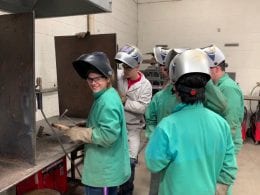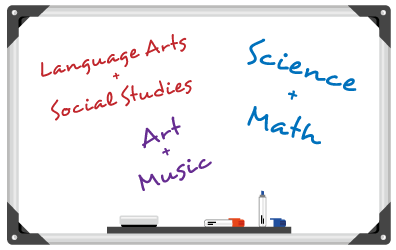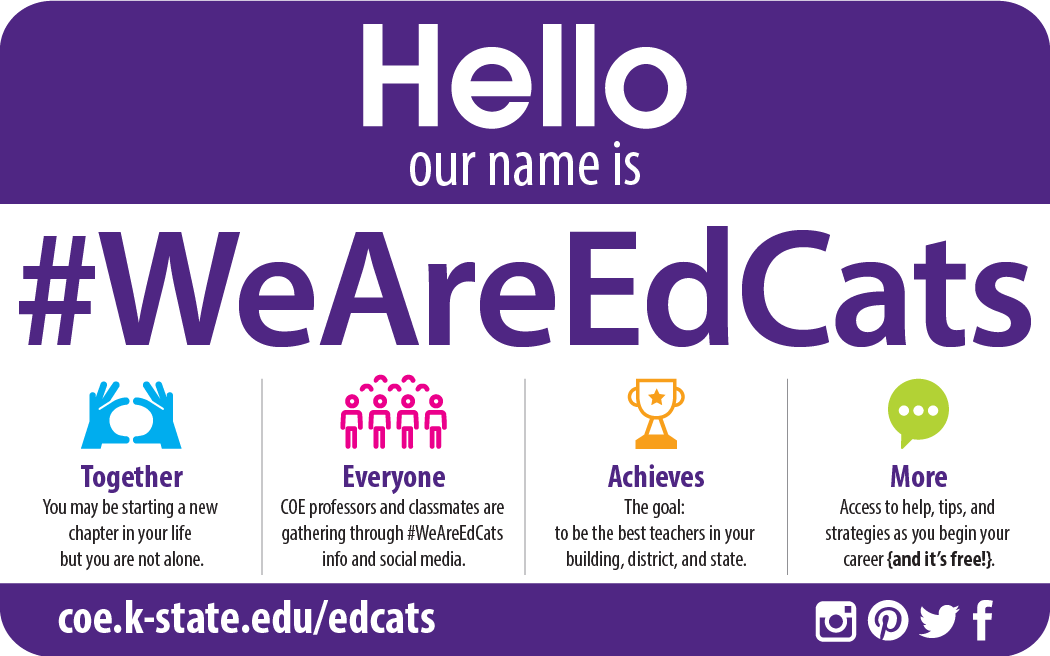Lori Goodson, Editor
Mary Hammel, Technical Editor
Category: February 2019
In the Classroom: Josie Reilly

Name: Josie Reilly
School district: USD 470
Arkansas City High School/ Arkansas City Middle School
City/State: Arkansas City, KS
Class/content area taught: High School and Middle School Agriculture
What you are most excited about with your new career: The most exciting part about beginning my career is being able to combine two of my passions together, agriculture and people! Coming here to Ark City has also allowed me the opportunity to work with two experienced teachers in our agriculture program, which I enjoy very much. We all work together well and bring out the best qualities in each other to help best serve our students. Being a part of a three-teacher agriculture program has been an awesome experience thus far thanks to my two amazing partners!
What you enjoy most about teaching: My favorite thing about teaching is being able to build connections with my students and fellow educators. I believe positive relationships play an extremely important role in the lives of students and being a teacher allows me to build upon them every day!
Ways your school/district has supported you: I have been blessed to have an administration and school district who supports our agriculture program in many ways. I appreciate the warm welcome I received being a rookie and trust they put in me to do my job well. Any time our program has a need, our school has always backed us up. I have always felt comfortable asking questions and seeking advice from our administration and staff. It is great to be a part of a school who bends over backwards to help their students and teachers be successful.
 Ways KSU especially helped prepare you for your new career: I believe Kansas State University has prepared me well in building a strong knowledge of agriculture and ability to network with people. I had many opportunities to work with a wide range of people which in turn prepared me well to with a diverse group of students. The connections I made in the agricultural world have benefited me greatly as I was able to meet many friends and mentors who continue to support me in my career through KSU
Ways KSU especially helped prepare you for your new career: I believe Kansas State University has prepared me well in building a strong knowledge of agriculture and ability to network with people. I had many opportunities to work with a wide range of people which in turn prepared me well to with a diverse group of students. The connections I made in the agricultural world have benefited me greatly as I was able to meet many friends and mentors who continue to support me in my career through KSU
Specifics about your background that make teaching the perfect fit for you: Coming from a family of teachers, it has always been in my blood! Having both my mother and father as teacher then seeing how both of my sisters fell in love with the profession too, I knew I was right where I needed to be. I love being able to help educate the next generations and encourage them to make a positive impact in the world. I can’t picture myself being this happy with any other career!
Other thoughts: I would like to say thank you to my family, teachers and friends who have supported me in my journey to becoming an agricultural educator. I am excited to finally be beginning my career and can’t wait to see what life has in store for me!
Remembering technology in the good ol’ days
 We decided to go down memory lane with some of your COE professors and ask them what “technology” they had in their classroom for their first year.
We decided to go down memory lane with some of your COE professors and ask them what “technology” they had in their classroom for their first year.
Mrs. Kaylee Myers (Elementary Education)—“An overhead and a cassette/taperecorder!”
Dr. Vicki Sherbert (Secondary English/Language Arts, Speech/Theatre, Journalism)—“I had an overhead projector and created transparencies on clear acetate to show on the screen. We had a ditto machine in the workroom that had a drum containing some sort of fluid. I created ditto masters that would be clamped onto the drum which spun around and around, copying the text in purple onto the pages. There was a Xerox machine at the school board office, but we weren’t allowed to use it.”
Dr. Brad Burenheide (Secondary Social Studies)—“A lovely green screen Apple IIe.”
Dr. Todd Goodson (Secondary English, Speech/Theatre, Journalism)—“The school invested in a photocopy machine so teachers didn’t have to type everything they wanted to reproduce on purple stencils. If you’re curious, find the oldest teacher in your building and ask that person what a purple stencil was.”
Dr. Sally Yahnke (Family and Consumer Sciences)—“Mimeograph machine, overhead projector, opaque projector, movie projector, filmstrip projector.”
Mrs. Cyndi Kuhn (Technology)—“I had absolutely nothing my first year, way back in 1975 when I began teaching, we had typewriters and mimeograph machines. It was paper, paper paper, and you really had to plan ahead.”
You’re not alone: Check out these faculty members’ silly mistakes
 We asked your former professors: What’s one of the funniest/silliest mistakes you made as a first-year teacher?
We asked your former professors: What’s one of the funniest/silliest mistakes you made as a first-year teacher?
Dr. Todd Goodson (Secondary English, Speech/Theatre, Journalism)—“The office called for me to go to gym for a head lice check. I forgot to take my students with me.”
Dr. Sherri Martinie (Secondary Math) – “I hardly ever sat down. I stayed busy the whole day and even often ate lunch on the go. One day I was opening a pull-top can of tuna walking down the hallway and sliced my thumb. I had to leave school and have someone take me to get stiches! Lots of people teased me about it. I learned that I needed to stop, sit down, relax and enjoy a 20-minute lunch! My well being depended on it!”
Dr. Sally Yahnke (Family and Consumer Sciences) – “I’m not sure if it was silly or funny, but I was embarrassed and uncomfortable. I had a class of 18-year-old boys, and I taught them human sexuality. I was 22! At one point in the conversation we were talking about male anatomy, and I finally said, “I’m guessing you know more about this than I do!”
Dr. Tom Vontz (Elementary Social Studies) – “I left my barn door open after lunch.”
Dr. Phillip Payne (Music Education) – “Most of these are really inside jokes among our staff! We still have a great time with them… while this is not silly, the moral of the story is enjoy every moment and don’t take yourself too seriously.”
Spring is on its way…and so is the testing season
 It’s nearly time for assessments, so we’re offering some tips to help you make the most of it!
It’s nearly time for assessments, so we’re offering some tips to help you make the most of it!
- Let your students’ parents know about the approaching assessments.
- Give students and parents an idea of what the assessments will cover.
- Remind your students that they’re prepared for the assessments.
- Encourage students to eat well – especially breakfast – before a testing day.
- Have students drinking adequate amounts of water.
- Encourage them to do their best – and be proud of them when they do.
- Know that some students are taking tests in more than one content area, so understand if they’re especially stressed.
- If your students are preparing for tests, try to balance that with enjoyable student-focused activities.
- Try not to stress over these assessments; you’ve been preparing your students throughout the year with all your engaging activities and assignments.
- Smile. Your calmness and confidence will carry over to your students.
- And, just to balance things a bit, check out this article on creative teaching activities that DON’T involve filling in bubble answer sheets: Bubble Test Rebellion.
Working together…for some great activities
 Some of your former secondary professors provided suggestions on content areas that would connect well with their content areas. Here’s what they had to say:
Some of your former secondary professors provided suggestions on content areas that would connect well with their content areas. Here’s what they had to say:
Cyndi Kuhn (Technology) – “Art and music.”
Dr. Brad Burenheide (Secondary Social Studies) – “Language arts/social studies is a natural fit!”
Dr. Todd Goodson (Secondary English, Speech/Theatre, Journalism)—“Any content can collaborate with any other content, and any grade level can collaborate with any other grade level. The most important thing in a successful collaboration is the quality and the nature of the professional relationship of the teachers leading the project. Bright, enthusiastic teachers who reinforce each other’s creativity can help their students see powerful connections across contents and ways of thinking. On the other hand, forced collaboration between teachers who have no desire to work together usually doesn’t end well for anyone. Our best colleagues are those who make us better, as teachers and as people. When you encounter those individuals, look for ways to collaborate so your students can see how we make connections across all disciplines.”
Dr. Sherri Martinie (Secondary Math) – “Science.”
Dr. Vicki Sherbert (Secondary English/Language Arts, Speech/Theatre, Journalism) – “English/Language Arts, Speech/Theatre, and Journalism present wonderful opportunities to collaborate in all content areas. Often there are topics covered in Social Studies classes to which literary works can be paired so that students are immersed in stories that bring historical events to life. There are also more and more non-fiction texts that can be read in the ELA classroom that support science topics and inquiry processes.”
Dr. Phillip Payne (Music Education) – “ All the subjects… specifically – Visual Art, History, Language Arts, Math. These all allow for great integration projects within courses.”
Dr. Tonnie Martinez (Secondary Language Arts) – “American Literature and American History; World History and World Literature.”
Dr. Sally Yahnke (Family and Consumer Sciences) – “I would encourage my students to collaborate with as many content areas as possible. I think supporting the content areas through family and consumer sciences is important for students to realize the relevance of the core classes in everyday life. Math just doesn’t happen in the math room or science in the science lab, but it is incorporated into what we do on a day-to-day basis. I think by working together, we can all help students succeed.”
Be sure to explore #WeAreEdCats
 EdCats continues to grow! Are you a part of this great network?
EdCats continues to grow! Are you a part of this great network?
We want to help beginning and early career teachers like you thrive in your career! Check out #WeAreEdCats for teaching tips and to stay in touch with the COE! Check out the website at coe.k-state.edu/edcats.
I want to hear from you!
What’s up?
Why don’t you send us a photo of you at work in your classroom! Or, do you have a question about classroom procedures? A suggestion for a topic we should address in Before the Bell? Want to add your name to our mailing list? Or provide a different email for our list? At the very least, just email and say hi!
Early-career teachers, feel free to jump in and offer suggestions to those who are following your career choice!
We’d love to hear from you, so please email us at lagoodson@k-state.edu.
Go, COE Cats!
In our next issue….
 Spring is in the air! Well, in between snowflakes–but we’re getting close!
Spring is in the air! Well, in between snowflakes–but we’re getting close!
And you are SO close to finishing your first (or beyond!) year as a classroom teacher! With that in mind, we’re going to provide some information that should help you have an amazing finish to your hear. We’re going to focus on the following in our March issue:
- Assessments – The Sequel
- Spring Break Recharging
- Purple Possibilities